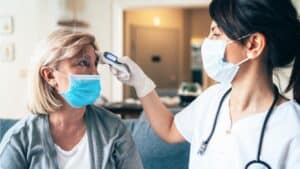
It’s likely that we all know someone who was diagnosed with Covid-19. In my case, three friends fell ill, and when I called them later on, essentially I wanted to know three things – how they’re doing now, whether their pandemic experience changed their outlook on life, and what the rest of us can learn from them.
Most of all, though, I wanted to let them talk about what had happened to them.
Lynne’s Ordeal
Lynne, who lives in northern Illinois but often travels to NYC, is no stranger to LaGuardia Airport. But on March 9, 2020, when she arrived for her return flight to Chicago, her surroundings felt unfamiliar.
Hand sanitizer was everywhere, the passengers dutifully wiped down their seats with some version of portable Clorox, and news of the coronavirus was everywhere.
There was talk that it all started with Covid-19 “Patient Zero” in suburban New Rochelle, the very area Lynne had been visiting.
That was a Monday. By Friday, Lynne was running a temperature of 101 and had a cough. Yet, despite her New York travel, she was turned down for a test because she could cite no direct interaction with someone from China, and her “New Rochelle” reference set off no alarm bells in the Midwest.
Testing Took Too Long
Still, her doctor was worried and advised Lynne to go to an immediate care clinic. She was administered a flu test, that came up negative, and sent home. Within a couple of days, her fever spiked to nearly 103 degrees, and her husband, Mark, started running a low-grade fever as well.
They returned to the clinic for tests twice the following week, as the medical team had lost the first swabs! The second time around, the onsite doctor instructed them to call his cell phone as soon as they arrived and isolated them to a private area.
“At that point, I was really sick,” Lynne shared. “We asked for a chest x-ray and were told that wasn’t feasible because it would take them days to sterilize the machine afterward.”
Lynne’s memory from the next few days is spotty. She knows she was barely eating, and her friends were expressing concern, though she did show sudden appetite for mandarin oranges.
When the clinic called with the news that Lynne and Mark both tested positive for Covid-19, the nurse expressed concern that Lynne might become dehydrated. They were cautioned that, should the need arise to go to the ER, they should call first.
“I was not alarmed at that point,” Lynne says. “But the next day is hazy.” Her husband describes it as watching his wife disappear – seeing Lynne’s light slowly dimming, as if someone were just emptying her out. Lynne remembers Mark frequently asking, “Are you short of breath?” Her answer was always “no.”
Off to the Hospital
The next morning, Lynne needed Mark’s help just to get the covers off so she could get out of bed. She had to hold the walls to walk to the bathroom. “That’s when I had an epiphany,” she says. “I told Mark that I needed to go to the hospital. I made sure that I changed from pajamas to sweats – I think we women do insane things sometimes!”
A medical team was waiting for them outside the Emergency Room entrance. The nurse sternly instructed Mark, “Do not get out of the car. Just go home.”
Lynne recalls, “Inside, a doctor asked whether I’d noticed changes in my ability to taste. I said, ‘Yes,’ and he said, ‘We’re hearing that.’” Whatever happened next, Lynne cannot remember.
The nurses called Mark regularly to update him on Lynne’s progress. The first night, she was administered oxygen. The next day, exactly two weeks after she caught that flight from New York, Lynne was sedated, intubated, and transferred to a nearby hospital that had a designated Covid center.
Two days later, Lynne has the memory of feeling the ventilator being pulled out. “Just like in a movie, I gagged and then I was conscious,” she says. “No one explained things to me. I don’t fault them. No one wanted to be near me. The doctors and nurses were terrified because this thing was exploding.
“The ICU nurses were wearing helmets with hoses maybe they were carrying their own air filtration systems with them. They were dealing with something completely unknown to them, and they were very busy. But the doctor checked on me often and texted Mark about my condition, which was improving.”
Lynne was discharged on her 70th birthday, March 31. Her temperature and vitals were normal, and her appetite was starting to return. Already thin with a small frame, Lynne had lost 10 pounds and a lot of strength. “The experience was surreal,” Lynne says. “That’s the only word I can use to describe it.”
Val and Carrie
It was still February when my friend Val, 68 and living in the early epicenter of Seattle, began battling a cough and severe fatigue. Before long, more symptoms piled on: bad headaches, gastro-intestinal distress, night sweats. Val felt as if she had a brick sitting on her chest. Soon she was sleeping 16 hours a day.
“I thought it was a bad cold,” Val recalls. “Covid didn’t even have a name yet. Seattle was the first city to have a death, but initially when I got sick, nobody was talking about this virus.”
Everyone certainly was talking about it in Chicago in mid-April when my friend Carrie, 50, came down with suspicious symptoms. But like the other two women, Carrie didn’t have shortness of breath, the symptom we were told at the time signaled the need for urgent attention. Carrie wasn’t even running a fever.
What Carrie did have was a debilitating headache. Her husband was also struggling with seemingly atypical symptoms – severe nausea and vomiting. Since at first he was refused a test, Carrie knew she wouldn’t qualify for a test either, but she thought she should try to get tested anyway.
On the phone call to the clinic, the person she spoke with was sympathetic. “I was guided to say I did have a fever,” Carrie confesses. “That’s how I got a test.” It turned out positive.
Throughout March, Val didn’t even try. “Tests were practically unavailable in Seattle, plus there was a high error rate,” Val remembers.
“They were telling us to go to the hospital only if we couldn’t breathe. My symptoms were broad, and they’d disappear and then reappear three or four days later. I kept telling friends that I’d become a hypochondriac, but by April it was clearer to me that I’d caught the virus. I still wasn’t able to get tested at that point.”
While Carrie’s symptoms remained largely mild, she had a scare with the Covid “brain fog” she experienced over two days about three weeks into the illness.
“I was working and had to stop because I couldn’t use a computer or phone, add two-digit numbers, answer simple questions or even form proper sentences,” Carrie remembers. “I knew that the virus could cause a stroke, so I went for medical help. They ruled out a stroke, which lessened my stress and helped to lift the fog.”
How Are They Doing Now?
I’m grateful that all three friends survived the virus. Still, only two have fully recovered. Lynne stopped needing naps six weeks after she returned home and is back to gardening and walking. Carrie, too, is feeling like her old self.
Although she was the first of the three to get sick, Val is still waiting to get well. Taking a short walk or climbing a flight of stairs wears her out. In June, she went for an in-person exam, and the doctor prescribed medication that seemed to help at first.
Lately, though, chills, joint aches, and fatigue have returned. Val doesn’t know what to make of it. She never did get a test, but the doctor told her she can assume it was the virus. That makes Val one of the longest “long-haulers” – the name given to people who have suffered from Covid-19 symptoms for more than two months.
“I probably should get a chest x-ray,” Val says, adding that she won’t be surprised if she learns that she has permanent lung damage.
How Did Covid Change Their Outlook on Life?
I thought these women would feel either like victims – who wouldn’t? – or like superheroes, able to walk freely among us with little fear of catching or spreading the virus. But they don’t identify with either description, although Carrie says she does feel as if she has a superpower because she is now donating her plasma every 2–3 weeks to help other Covid-19 patients.
“I’m donating for people who are already sick, maybe on ventilators,” Carrie explains. “They give them convalescent plasma, and within a few days that often helps to turn them around.” And rather than a victim, Carrie feels lucky that her case wasn’t worse.
Lynne feels lucky, too, because Covid-19 is the second major illness she has defeated. In 2015 she had colon cancer, which was discovered while it was still stage 1. “After getting through both illnesses, I feel like the luckiest person in the world,” Lynne says.
That doesn’t mean she feels bulletproof. Lynne points out that there’s not enough research yet to know how long antibodies protect survivors from contracting Covid-19 a second time and becoming contagious all over again. Meanwhile, she is not tempting fate.
“I’m self-quarantining as much as anyone,” Lynne says. “I was terrified in the hospital. I didn’t listen to the news, and at first I asked Mark not to give me details about what I’d gone through. Now the thought of travel or going into a restaurant is so frightening to me that I don’t know whether I’ll ever do it again. Maybe if there’s a vaccine.”
Past reassurances mean less to Lynne now. “We live in a bubble,” she says of herself and her friends. “We take care of ourselves and have the best medical care, and I still wasn’t fine. All these years of working out – I was fit. I thought my body would fight it off.”
Val, too, was living in a bubble of invincibility, and this experience has dramatically shifted her sense of well-being.
“I always thought that bad things just didn’t happen to me,” Val says. “I was willing to take risks because I didn’t feel vulnerable. I feel very vulnerable now! The world doesn’t feel safe. I had to take a bus one day, and that felt really dangerous to me. I don’t know whether I’ll ever recapture that innocence of striking up a conversation with strangers.”
What They Want the Rest of Us to Know
The biggest takeaway I learned from my friends is to monitor your body’s blood oxygen level. They all advised me to buy an oximeter, which measures that quickly and easily.
It’s not as much about your temperature, you may never feel short of breath, and symptoms can fail to show up at all or until days after you’ve infected other people.
Even if you know you’re sick, if you’re able to function you may not believe that you need medical attention. But if your oxygen level drops even a bit, into the low 90s, it could be an early sign that you’re headed for trouble.
“If you feel sick, take this seriously,” Carrie adds. “Covid-19 patients seem to have poor judgment when assessing their own condition and tend to think they can just push through.”
When death comes close, sometimes you respond by seeking out new life. Lynne just added a four-legged member to her family. “Our new puppy,” she muses, “is our harbinger of a healthy, active future.”
Do you know someone who has battled Covid-19 and survived? Was that you? What story can you share? What do you want the world to know about this disease? Let’s have a conversation and support one another in this difficult time.





